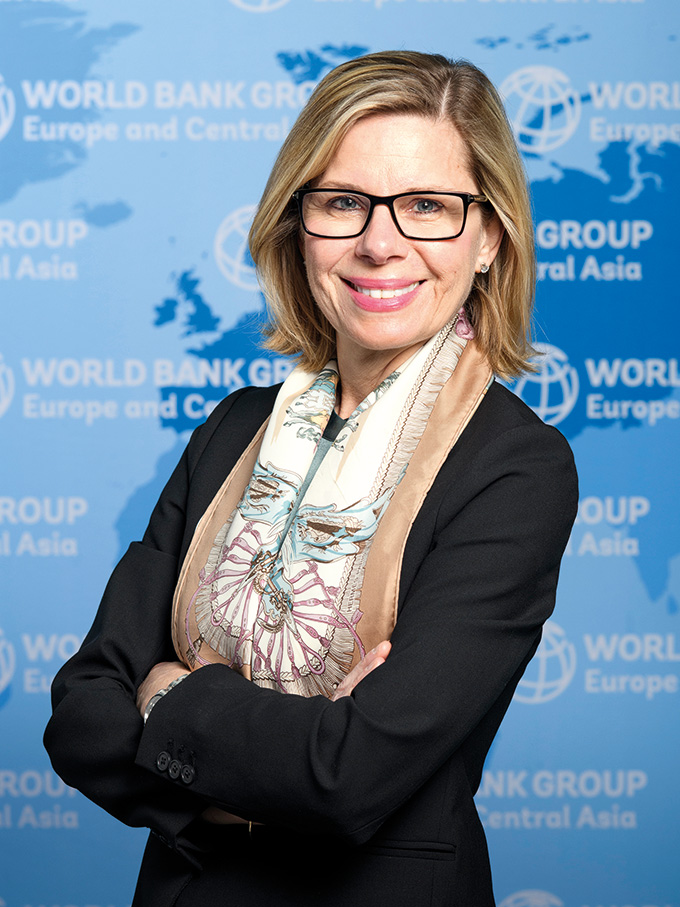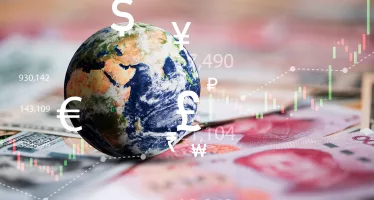World Bank Vice President for Europe and Central Asia: Interview with Anna Bjerde

World Bank Vice President, Europe and Central Asia: Anna Bjerde
Congratulations with your Mayday promotion as World Bank Vice President for Europe and Central Asia. Are you excited to lead the World Bank’s strategic, analytical, operational and knowledge work in the region?
Thank you! I am delighted to be returning to a region that I have spent a significant part of my World Bank career working on—notwithstanding the unprecedented and painful period that the world currently finds itself in. This is the fourth time I have worked in the Europe and Central Asia region. I first worked here in the early 1990s, then again in the late 1990s, and again about five years ago. It’s a region that is very, very close to my heart. In this role I am working very closely with governments in the region, as well as partners, to help our clients achieve strong development outcomes, with an immediate focus on addressing the health, social and economic impacts of the COVID-19 pandemic.
What is the World Bank doing in ECA in response to the COVID-19 pandemic?
The COVID-19 pandemic has left many countries battling severe health, social and economic impacts. We have seen a huge upsurge in demand for our support in the region. In the short-term, we are providing fast-track financing and policy tools to help protect people’s lives and livelihoods. In some cases, we have also restructured existing projects to quickly redirect financial resources to help countries mitigate this crisis. This has already benefited the Kyrgyz Republic, Tajikistan, Bosnia and Herzegovina, Moldova, Uzbekistan, Turkey, Georgia, and North Macedonia, and we are currently preparing support to several other countries in the region.
The fast-track financing is already paying for medical equipment, including test kits, respirators and ventilators, and strengthening the capacity of health systems, including training for health care workers. We have also focused on supporting social protection measures to protect the most vulnerable people, including those who have lost livelihoods and jobs. Going forward, we will continue to provide support to vulnerable groups affected by the economic impacts of the crisis, as well as assisting governments in the design and implementation of appropriate policy measures for economic recovery, ensuring our complete arsenal of financial resources, knowledge and policy expertise is used for maximum impact and strong country outcomes.
What personal experience and perspective do you bring to this challenge?
Over a decade ago, as a technical specialist with the World Bank, I worked with clients as the Financial Crisis was unravelling growth and prosperity around the world. That crisis spurred a significant increase in the World Bank’s assistance to countries, at both low and middle-income levels, and saw an overall increase in our support to countries. With the COVID-19 pandemic, we are looking at a much more complex crisis, comprising both demand and supply shocks: what began as a health crisis has quickly become an economic and financial crisis. In my experience, it is important to focus on helping countries as they come under severe fiscal pressures, while also ensuring targeted support to people and households vulnerable to losing their livelihoods, access to health, education and basic services.
You have worked in leadership positions all over the world. What are some of the similarities and differences between geographies when it comes to economic and sustainable development you can point to?
In the Middle East and North Africa region, where I worked previously, almost half the total population is under 24 years of age. By contrast, the Europe and Central Asia region has a significant aging population. This means different labor market policies, social protection schemes, and education and building of skills. But there are also many similar challenges across geographies. For example, the need to improve the business and regulatory environment for greater private sector investments and FDI, as well as the need to manage natural resources sustainably. I am especially concerned, however, about the deterioration in learning globally. The World Bank launched a Learning Poverty indicator last year that showed half of ten-year old children around the world can’t read and comprehend a relatively simple story. Many social and economic challenges transcend geographical boundaries.
How can you help push for inclusive growth in your new region?
This year – for the first time in over two decades – the extreme poverty rate will rise, reversing a trend that has lifted nearly a half billion people out of extreme poverty since 2010. Growth and poverty projections are now highly volatile and differ greatly across countries. Although we expect poverty rates to start to decrease again in 2021, recovery to pre-crisis levels might take longer. In addition to the World Bank Group’s rapid emergency response to save lives, our efforts are focused on helping client countries revive their economies. We remain committed to supporting reforms across the region and staying the course on critical issues such as developing human capital, addressing gender issues, promoting good governance and debt sustainability, and combatting climate change.
What areas of Europe and Central Asia will you support with World Bank finance and what industry sectors do you work in?
We work with over 20 client countries in the Europe and Central Asia region. Our support is broad, yet also prioritizes countries’ main development goals. For example, we are actively engaged in promoting human development, including health and education, building more responsible institutions, increasing private investment, improving service delivery, upgrading critical infrastructure, protecting the environment, and empowering marginalized groups. In addition to financing, the World Bank also provides technical assistance based on our global experience and facilitates sharing of knowledge and best practices among countries.
What are you doing to support the Banking Sector?
We are supporting client countries in implementing reforms focused on financial sector development. The goal is to preserve financial stability, ensure financial integrity and broader access to finance, improve financial infrastructure, and enable better access to finance for businesses and households. We are also supporting reforms in regulation and supervision, crisis management, recovery and resolution, and financial integrity. Our support to financial sector development has increased significantly to help countries with their COVID-19 crisis response.
What are you doing to support SME Finance?
We know that limited access to finance for small and medium enterprises (SMEs) is a persistent constraint for business growth and competitiveness. Ensuring greater access to affordable finance for SMEs has become even more critical during the COVID-19 crisis. We are currently preparing emergency response projects in Croatia, Georgia, the Kyrgyz Republic, North Macedonia and Turkey, which will facilitate financing from domestic banks to viable businesses that face temporary liquidity constraints and or had to shut down to follow social distancing guidelines. Maintaining access to finance for SMEs is essential to reduce job losses, prevent firm closures and bankruptcies, and soften the impact of the COVID-19 crisis on economies.
How is the World Bank investing in new energy infrastructure?
We are supporting client countries with both energy transition and energy security. A key priority is continuing reforms of energy utilities to enable efficiency and reliability in service delivery. We are also supporting the scale-up of renewable energy resources, as well as improving energy efficiency in buildings. In Ukraine, for instance, we have helped with the reform of the electricity and gas industries, and also the reform of energy subsidies, while ensuring that the poor and vulnerable are protected. In Uzbekistan, together with IFC, we are helping the government attract private investment in renewable energy as part of a broader reform of the energy sector.
Could you give some examples of disruptive and innovative technology which can contribute to socio-economic development and leap frogging?
Disruptive technologies are unlocking innovative solutions to a myriad of complex development challenges. In Europe and Central Asia, Estonia has become a digital powerhouse and was one of the first countries to adopt a national Artificial Intelligence (AI) strategy. Blockchain technologies are also widespread in ECA. Estonia, Georgia, and Ukraine have experimented with blockchain to set up land and real estate registries. In the battle against COVID-19, digital technologies are keeping businesses, governments and schools connected. In Turkey, for example, we are helping the government provide safe schooling through distance education to around 18 million students during the pandemic. In Kosovo, the government is investing in training youth to work online. And in Georgia, Moldova, and Armenia, we are helping governments define policies, regulations, and investment programs to close the broadband access gap, through innovative measures that crowd-in private investment.
How can your region recover from the pandemic economic outfall?
The COVID-19 pandemic is occurring at an already fragile time for the region. Our recent regional economic update forecasts that growth could rebound in 2021, but the speed of recovery will depend on countries’ ability to contain the pandemic and implement policies to support economic recovery. As many countries in the region are closely integrated into global and regional value chains, and rely heavily on trade, tourism and remittances, much also depends on how soon the rest of the world opens back up and recovers. In the interim, support to the private sector is critical. As I mentioned earlier, SMEs could benefit significantly from targeted government subsidies, business credits, tax cuts, or tax payment deferrals.
We are already seeing many countries take bold steps to arrest the spread of the virus and contain the economic fallout. The right policy decisions now can help minimize the human and economic costs of the pandemic and prepare for a faster recovery. Decisive policy measures that invest in health systems and provide safety nets for people, especially the most vulnerable, are absolutely critical.
About Anna Bjerde
Vice President, Europe and Central Asia, World Bank
Anna Bjerde became World Bank Vice President for Europe and Central Asia on May 1st, 2020. In this position, Anna leads the World Bank’s strategic, analytical, operational and knowledge work in the region. Anna has over 25 years of experience working in development in Africa, the Middle East, Europe and Central Asia, Latin America and the Caribbean, East Asia, and South Asia. Anna is a recognized leader in economic development, with a specific interest in inclusive growth and sustainable development.
You may have an interest in also reading…
Otaviano Canuto: Rising Use of Local Currencies for Cross-Border Payments
At the recent BRICS summit in Johannesburg, the leaders of Brazil, Russia, India, China and South Africa said they wanted
World Federation of Exchanges (WFE): Encouraging Investment in Emerging Markets Hinges on Co-operative Effort
Emerging market exchanges and policy makers are keen to encourage international investors, who play an important role in the development
‘Deep-Tech’ Founders-Turned-Investors Forge VC Powerhouse
‘We’re building the VC firm we wish we’d had as technical founders’. UK early-stage deep-tech VC firm SCVC focuses on


















































































